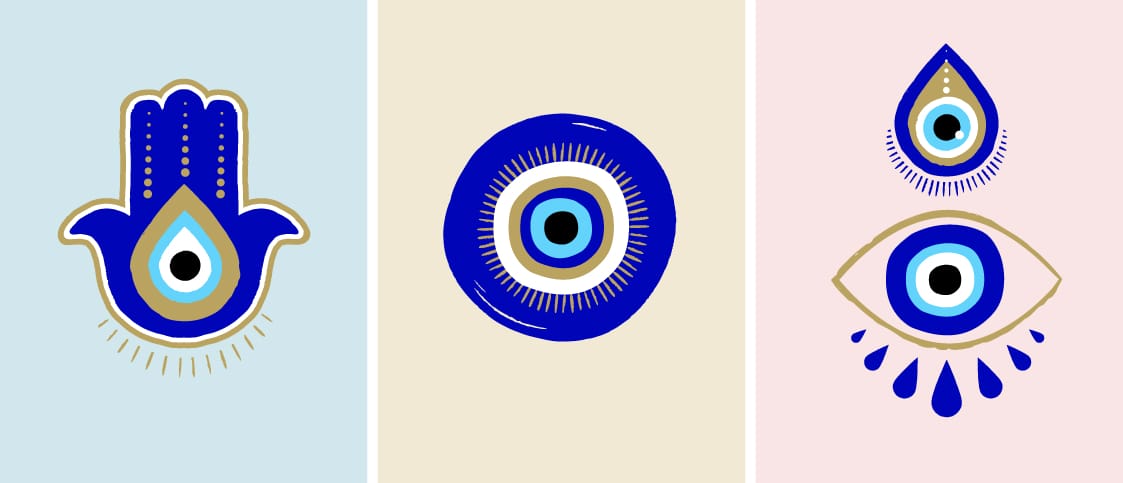From nazar to cutting your hair on the wrong day, how many of these do you relate to?
“Don’t book your haircut today,” my mum eerily warned me over the phone as I readied myself to go to the salon. “We don’t cut our hair on Tuesdays.” I groaned. I had been hearing some version of this my whole life, although I’m pretty sure the days were always changing based on some unofficial superstition handbook
that our Indian elders consult.
“My hair will be fine,” I replied in exasperation, another battle between tradition and scepticism lost. Depending on who you ask, cutting your hair, nails or beard (or even washing your hair) on specific days can be considered inauspicious. In a religious context certain gods or goddesses are worshipped on particular days so cutting anything could bring misfortune. From an astrological point of view, planets emit stronger rays on some days which is why we shouldn’t mess with our appearance or the universe. No word if all barbers are extra clumsy on these days and poke their customers with scissors, or if they are historically hungover on Tuesday and don’t want to go to work.
The problem with the millions of superstitions Indians contend with on a daily basis — in my sceptical opinion anyway — is that it seems to be an excuse to ward off unwanted and irritating behaviour, more than it serves to protect us. Everything can be called “bad luck” as a way to control undesired actions. Take for example when you were a kid and your parents told you not to shake your legs because there is a belief it will drive away your wealth and prosperity.
Now correct me if I’m wrong, but I’m pretty sure there is no link between our legs and bank account. In fact isn’t it your arms and fingers that control the act of pulling money out of your wallet and spending it on yet another purse that you really don’t need? But yes, shaking legs can be an annoying habit so it’s convenient that we associate it with a negative consequence to stop the jiggling.
And where do we start with the concept of “nazar” or evil eye? This superstition exists in numerous cultures with the belief that others can bring misfortune to you with their jealous gaze. Indians have plenty of ways to ward off nazar depending on who you ask. Babies and small children have a black dot (kala tikka) put on their forehead, cheek or behind the ear to make them appear less cute and protect them from malicious looks. Some people roast chillies on an open flame to burn away the afflictions caused by the evil eye. There were times I would just be laying on the couch watching TV and suddenly my mum was hovering above me and circling a lime three times around my head, based on a belief that it could remove any ill energy cast on a person.
When bad things happen, such as getting sick/hurt, your toddler refusing to eat, or any calamity in general, Indians like to believe this is the work of nazar. It’s impossible that it could just be a regular mishap of life as it must be the fault of someone else and their evil eye wishing adversity on you. Whether you accept it as true or not, eyes can indeed be evil when it’s your fellow Indians staring at you for no reason.
On the opposite end of the spectrum, some Indian superstitions for good luck can also be a nuisance. If your left palm starts itching it’s supposed to mean that money is coming to you (not that you’re starting to develop a rash). If a bird poops on you, that’s also a sign that positive things may happen (despite the grossness of being pooped on). Before leaving the house for a trip or important event, you are meant to eat a spoonful
of curd and sugar to ensure energy and a safe journey (regardless of any resistance that you are on a diet).
While there’s no harm in believing there are supernatural forces that guide us and could make our lives better, just like laddoo, everything should be taken in moderation. Oh wait, laddoos are regularly offered to gods and eaten by us mere mortals to protect us as well. So if nothing else, have a laddoo and stay blessed
An unreformed party girl and mother of two, writer, editor and observer Sumati Huber tries to make sense of our unique Thai-Indian society and the aunties that she will one day become.







